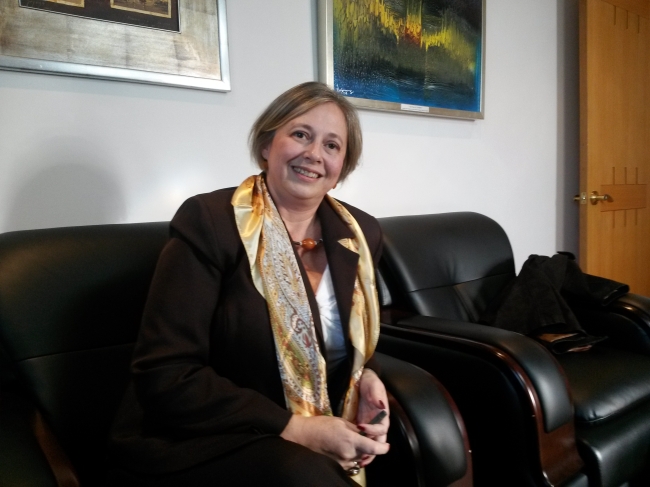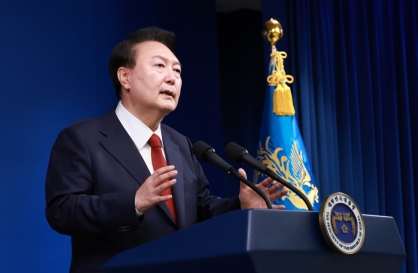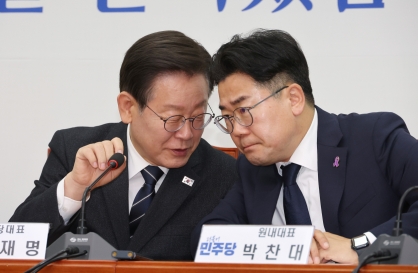Uruguayan Ambassador Legnani encourages women to aim high
By Korea HeraldPublished : March 9, 2014 - 20:11
“Every woman has to fight. She has to fight for her future, and her future does not have to be to take care of the house,” said Uruguayan Ambassador to South Korea Alba Florio Legnani in an interview with The Korea Herald on Wednesday, days before International Women’s Day was celebrated around the world.
Legnani is one of just seven female ambassadors out of the 100-plus heads of diplomatic missions here. She is also the senior envoy of an informal caucus of women ambassadors working in South Korea. She represented them during a meeting of the council of the diplomatic corps on Wednesday.
The six other high-level women envoys in South Korea represent Bolivia, the Dominican Republic, Austria, Ireland, Belarus and Malaysia.
Legnani is one of just seven female ambassadors out of the 100-plus heads of diplomatic missions here. She is also the senior envoy of an informal caucus of women ambassadors working in South Korea. She represented them during a meeting of the council of the diplomatic corps on Wednesday.
The six other high-level women envoys in South Korea represent Bolivia, the Dominican Republic, Austria, Ireland, Belarus and Malaysia.

Their group was initiated by the Belarusian ambassador when she organized an informal luncheon about two years ago, Legnani said.
The United Nations officially recognized March 8 as International Women’s Day in 1975, but the appointment of a day to highlight women’s empowerment and rights goes back more than 100 years.
The first Women’s Day is thought to have been National Woman’s Day, observed in the United States on Feb. 28, 1908, when the Socialist Party of America sought to recognize female garment workers during a labor strike in New York City.
Legnani said the struggle for women’s rights can be summed up in a quippy Spanish play on words: “Tenemos que transformar los derechos en hechos,” which she explained means, “Let’s transform the rights into facts.”
That struggle is not likely to be easy for women here as over the past few years South Korea has slipped in world rankings of the social status of women.
South Korea ranked 111th out of 135 countries surveyed, according to the World Economic Forum’s Global Gender Gap Report 2013. Worse, the reported noted, is the fact that the social status of women in South Korea has slipped every year since 2010.
Electing its first woman president in December 2012, though certainly laudable, could belie the fact that South Korea has a dearth of women at the highest levels of national leadership, according to another global survey.
South Korea ranked 88th out of 188 nations, with just 15.7 percent or 47 female representatives out of the 300 making up the National Assembly, according to the Women in National Parliaments report published by the Inter-Parliamentary Union in December 2013.
The situation is worse still for South Korean women aspiring to rise to the ambassadorial level in the Ministry of Foreign Affairs.
Just five of the 294 officials ranked director-general or higher at the Foreign Ministry are women, according to data compiled in November 2013.
That means that less than 2 percent of the nation’s high-level Foreign Service officers are female. Twenty of the approximately 280 deputy director-level officers, or 7 percent, are women. South Korea does not have a single woman leading one of its 118 foreign diplomatic missions.
Legnani said that in her country, as well as other countries, one way to increase the number of women at the highest levels of business or government is by empowering women and encouraging girls to aim high.
A woman can be as effective an ambassador as a man, she said. “There are no jobs meant for men or for women. One might be good or bad at a particular job, but this depends on the individual, not on one’s gender.”
Legnani is in fact not a career foreign service officer. She is a lawyer and spent some 15 years advising her government, in particular the transportation and the health and welfare ministries, and worked with the legislature. She began her work here in South Korea in October 2010.
“But it is something very personal. You have to fight for your position in society, for your education, for your position at the office. It means working hard and struggling for it,” she said.
Legnani said her case is perhaps not typical in her country of Uruguay, because she did not have the family pressures that many women face. She said she decided not to get married and has no children to look after. “So, maybe for me, it might have been easier.”
“In Uruguay, women have to take on domestic activities by themselves. If they have children, they have to take care of them on their own,” she said. “They have to cook and have to clean and have to take care of the parents, too, but those activities are generally not shared with the men. It is a woman’s responsibility.”
National governments have a role to play, too, by cultivating supportive working conditions for career-minded women, she said. As examples of possible policies, Legnani pointed out how flexible working arrangements on the job and easy access to child care could support working women by helping them balance career with family.
By Philip Iglauer (ephilip@2011@heraldcorp.com)
-
Articles by Korea Herald









![[K-pop’s dilemma] Time, profit pressures work against originality](http://res.heraldm.com/phpwas/restmb_idxmake.php?idx=644&simg=/content/image/2024/05/08/20240508050705_0.jpg&u=20240508171126)









![[Today’s K-pop] Stray Kids to drop new album in July: report](http://res.heraldm.com/phpwas/restmb_idxmake.php?idx=642&simg=/content/image/2024/05/09/20240509050659_0.jpg&u=)